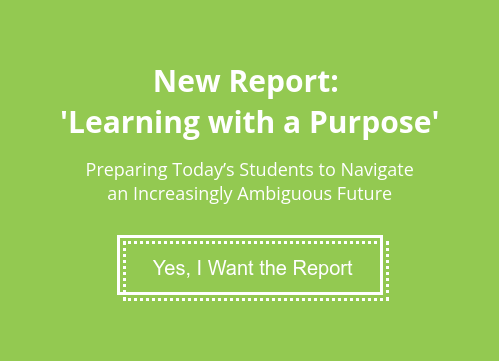“I want there to be a purpose behind what students are doing with school. And, I think what you find when you make that pivot is - you inspire.”
~ Dr. David R. Schuler, High School District 214, Superintendent, D214 & Founder, AASA Redefining Ready
From high school to elementary school students as young as 5th grade, purposeful work in school, where students are 'all in', can be an important if not critical approach that results in deeper learning and relevant skill building.
Big Ideas from Young Students
Purpose in learning and inspiration were prominently on display during a Zoom conference call I participated in just as the school year was wrapping up. Fifth grade students from a Leander, Texas elementary school were pitching their business concepts to judges. That’s right, 'pitching business concepts.'"These young entrepreneurs signed up to tackle some of the world’s most pressing, enduring problems and were free from limited thinking in their solutions - no fear of failure, or lack or resources or creativity - exactly what we want in our future leaders."
~ Ashley Blackburn, guest observer of an elementary school student 'Pitch'
What do 5th grade students pitch? Well, here are just a few of the business ideas from these young entrepreneurs:
.jpg?width=300&name=SeedsofchangeJPG%20(2).jpg) Stem hunger and help the planet by saving seeds from common vegetables and fruit used in your home. Students plan to place seed donation boxes in various neighborhoods and then distribute the seeds to families in need to create home gardens. And then there is the team named 'Infinite Resources.' This team of students is focused on the reuse of different atoms to reconstruct another material. “Use something else to create something else,” is their slogan, complete with a CAD design.
Stem hunger and help the planet by saving seeds from common vegetables and fruit used in your home. Students plan to place seed donation boxes in various neighborhoods and then distribute the seeds to families in need to create home gardens. And then there is the team named 'Infinite Resources.' This team of students is focused on the reuse of different atoms to reconstruct another material. “Use something else to create something else,” is their slogan, complete with a CAD design.
.png?width=300&name=blog3.Screen%20Shot%202020.%20Grandview.Hills.Elem.FreshINCedu.Pitch%20(1).png) Another business aims to protect animals and your car by installing a sensor on your car’s exterior to prevent accidental crashes. This impressive group of 9 and 10 year-olds had researched problems that our world is facing and were inspired to solve them. In fact, they found purpose in their work.
Another business aims to protect animals and your car by installing a sensor on your car’s exterior to prevent accidental crashes. This impressive group of 9 and 10 year-olds had researched problems that our world is facing and were inspired to solve them. In fact, they found purpose in their work.
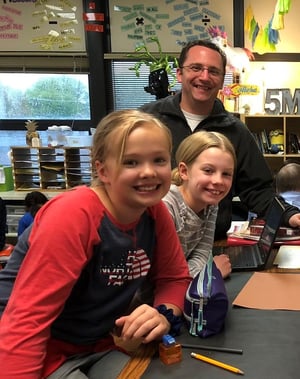 These young students articulated the problem to address, offered a creative solution, and declared how to execute their solution. Practical? Possible? Some of the concepts were more possible than others, but remember these students are in 5th grade. Perhaps as they learn and mature, they’ll develop ideas from the seeds planted in this 5th grade freshINCedu experience - a youth entrepreneurship curriculum from Uncharted Learning.
These young students articulated the problem to address, offered a creative solution, and declared how to execute their solution. Practical? Possible? Some of the concepts were more possible than others, but remember these students are in 5th grade. Perhaps as they learn and mature, they’ll develop ideas from the seeds planted in this 5th grade freshINCedu experience - a youth entrepreneurship curriculum from Uncharted Learning.
What the judges and students accomplished during this video conference call was not quite what the teaching team had initially intended. The original entrepreneurship experience called for in-person pitches followed by students’ execution of the concepts. Then, COVID 19 happened and several creative pivots were required from both the teachers and students, including moving to a virtual Pitch event.
"I was so impressed by the students’ agility and willingness to shift gears. They weren’t deterred! They handled the Zoom better than most adults I know!"
~ Belinda Wells, Leander ISD Grandiew Hills Elementary School Teacher, freshINCedu
Purpose and Pivots Drive Authentic Student Engagement
During the virtual Pitch, internet hiccups did not prevent students from sharing their passion for their projects. The panel of volunteer judges asked questions, and each was addressed in earnest. From what we witnessed, learning was anything but distant. What did the students have to say about the experience?
"I learned that if you put your mind to something then that something will put you somewhere good in life."
"I can do things independently and not have people give me the answers, but rather have me find them out myself."
"[An entrepreneur is] Someone who believes their destiny is to change the world."
In the end, these students benefited from a robust, authentic educational experience, while building the skills and confidence to address problems head on.
"From District administration to classroom teachers, all involved saw how children of any age can develop the mindset and the skills to change the world."
~Kathy Goecke, Leander ISD, Grandview Hills Elementary School, Principal
Purpose in Education
Purpose in learning is a critical tool in education for deeper engagement and learning. This concept was explored in a recent webinar (which can be accessed here): ‘Learning with a Purpose: Entrepreneurship Education in a Post-Pandemic World.’ Superintendent, Dr. Dave Schuler, and Entrepreneur and Uncharted Learning Cofounder, Michael Miles share how this approach can be a game-changer for students. This is especially true in light of these uncertain times, and the increased importance of skill-building around agility, perseverance and creative problem solving to meet the demands of today’s dynamic workplace.
Following are excerpts from that conversation:
Preparing Students for What's Next
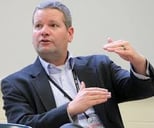 (DAVID SCHULER) I don't want our kids just to go from one class to another. I want there to be a purpose behind what they're doing with school. And, I think what you find when you make that pivot is - you inspire.
(DAVID SCHULER) I don't want our kids just to go from one class to another. I want there to be a purpose behind what they're doing with school. And, I think what you find when you make that pivot is - you inspire.
What we want to do is make sure they find out what they don't want to do for the rest of their lives. So they don't have to wait until they're a sophomore in college to shift. Give them those real-world experiences to make high school engaging and relevant. That's what it's all about.
.jpg?width=289&name=Karen.2016-11-18%20Buffalo%20Grove%20-%20INC%20Alum%20Startup%20-%20SkunkAid%20(1).jpg) For teachers, this is to dream about things they never dreamed possible before (for their students). And I think that's so critical. Because, teachers get into teaching because they love to learn. Not because they love to teach. And so, if we can inspire their love of learning, it's going to just provide greater opportunities for our kids.
For teachers, this is to dream about things they never dreamed possible before (for their students). And I think that's so critical. Because, teachers get into teaching because they love to learn. Not because they love to teach. And so, if we can inspire their love of learning, it's going to just provide greater opportunities for our kids.
So, (at D214) we have everything from a ‘Startup Showcase’ experience through (INCubatoredu)..., to a Medical Academy preparing people for healthcare, and a Teacher's Academy or ‘Ed Prep’ for people who are interested in becoming Teachers, and manufacturing and robotics -- all to prepare students to be able to enter the workforce in a way that allows them to be nimble and agile.
Agility is Essential
(DAVID SCHULER) I believe the workforce is going to reinvent itself several times throughout our kids' work lives, so they'd better be able to think critically. And, to be able to work together and collaborate and to problem solve. And that's what we do.
I've been fortunate enough to work with our National Superintendent's Association where we've launched an initiative called The AASA Redefining Ready! Initiative. It's a research-based approach to what it means to be college, career, and life ready - but not only looking at test scores.
Because I just think it's so critical … if we want to see the greatest generation the world has ever seen, we need to create graduates that can adapt and meet the needs of our country, not just be able to do well on a standardized test.
Applying the Skills of an Entrepreneur
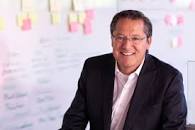 (MICHAEL MILES) I think what you'll see as you prepare students for work, is that the entrepreneurial mindset and skillset is very relevant in a startup and also in large companies.
(MICHAEL MILES) I think what you'll see as you prepare students for work, is that the entrepreneurial mindset and skillset is very relevant in a startup and also in large companies.
I think the entrepreneurial skillset that you (David) are teaching students and the one that we're trying to promote at Uncharted Learning fits into every single career path that you're teaching in high school...all of the great work that District 214 is doing.
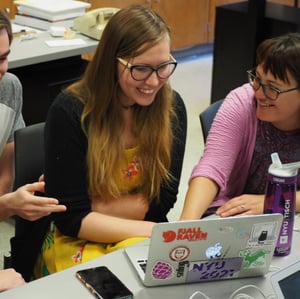 If you go into one of the D214 schools, there is hands-on application -- teaching kids about manufacturing and teaching kids about healthcare and teaching kids about teaching. In all these career paths...we have to understand what problems we're solving for people, and what our value proposition is, and how to communicate with people, and how to problem-solve. So, the entrepreneurial spirit that we're trying to build through Uncharted Learning programs ... our vision would be that this isn't just a business class, but this is a class that sits almost as a capstone for every single… career path that kids are learning.
If you go into one of the D214 schools, there is hands-on application -- teaching kids about manufacturing and teaching kids about healthcare and teaching kids about teaching. In all these career paths...we have to understand what problems we're solving for people, and what our value proposition is, and how to communicate with people, and how to problem-solve. So, the entrepreneurial spirit that we're trying to build through Uncharted Learning programs ... our vision would be that this isn't just a business class, but this is a class that sits almost as a capstone for every single… career path that kids are learning.
A Growth Mindset and COVID
%20_%20image.PNG.4.jpg?width=300&name=Alamo%20Heights%20Business%20Inc%20(@AHHSinc)%20_%20image.PNG.4.jpg) (MICHAEL MILES) Progressive organizations are saying, 'what did we just learn (from the pandemic)?' So, we're looking at (for example) what will be done virtually, not just during COVID-19, but what will be done virtually forever. And, I love to hear things like ‘we started off with version 1 (of an experiment), moved to version 7’... it's continuous improvement. That's at the heart of entrepreneurial thinking. You build, you measure and you continually do that and you learn again, and you build it, and then you measure it and then you learn again. You go through this cycle of iteration and we’re teaching students how to do that. So, with this they can be productive in the workforce.
(MICHAEL MILES) Progressive organizations are saying, 'what did we just learn (from the pandemic)?' So, we're looking at (for example) what will be done virtually, not just during COVID-19, but what will be done virtually forever. And, I love to hear things like ‘we started off with version 1 (of an experiment), moved to version 7’... it's continuous improvement. That's at the heart of entrepreneurial thinking. You build, you measure and you continually do that and you learn again, and you build it, and then you measure it and then you learn again. You go through this cycle of iteration and we’re teaching students how to do that. So, with this they can be productive in the workforce.
I'm involved in so many companies and I have the benefit of seeing companies that are nailing this. And then some companies that are not. So, I've tried to understand, ‘why is that?'. Why are some organizations able to cope differently than others? When I unpacked it, it’s the difference between a fixed mindset, which is having a difficult time coping, and a growth mindset of saying, how are we going to embrace that?
So, it's happening. It's happening everywhere.
Are Your Students 'all in'?
(DAVID SCHULER) Why would you expect kids to be 'all in' on a project that has no meaning? We've got to create the projects that encourage kids to want to do it. You can build confidence, but you build real confidence and a real purpose if there's meaning behind the project.
I think anytime that you can encourage project-based learning, as long as it's facilitated appropriately, there's no way that it does not create more value than a teacher in front of a class presenting - and then worksheets.
Students have to be able to collaborate. They must learn to be honest enough with someone to say, ‘You know what? I'm not sure that's right.’ But say it in a way that's not demeaning and mean. Because, it's the only way that a group dynamic is going to work to create that stronger solution at the end of the day. And, if we allow our kids to graduate and walk across that stage - virtual or in-person - without the confidence to understand what it means to be all in, when there's something of meaning associated with it, shame on us.
We Must Innovate
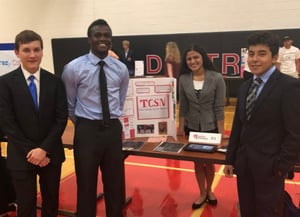 (DAVID SCHULER) Especially during these times, I just think we have to teach our kids how to be incredibly, incredibly nimble.
(DAVID SCHULER) Especially during these times, I just think we have to teach our kids how to be incredibly, incredibly nimble.
And I think (students) can go 'rogue' while still having parameters in place. So, we provide guard rails. But everything within those guardrails, man, go build it. Do it. Be creative, innovate, make it a great experience for kids. And if you have resources like Uncharted Learning, you can do that in a way that's just different from a traditional textbook or a traditional setting. This has to be done with a different mindset. And what I hear from Mike (Michael Miles), and what I hope people are hearing from me is that the end of the day, it comes down to a growth mindset and continuing to be innovative and iterative to meet the needs of our students.

